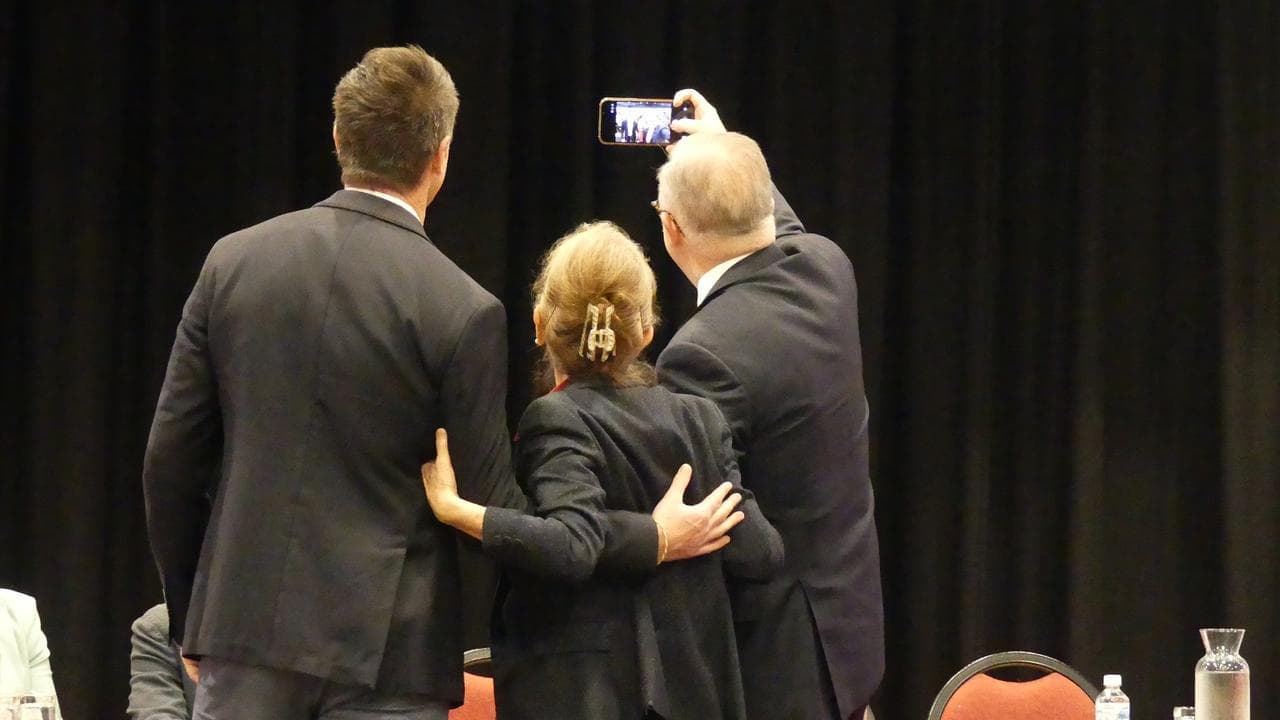WHAT WAS CLAIMED
Ninety-three per cent of children who change their gender end up regretting it.
OUR VERDICT
False. Studies into rates of regret among young transgender people put the figure at about one per cent or lower.
Donald Trump Jr has used an Australian radio interview to claim 93 per cent of children who go through gender transition later regret it.
The claim is false. Academic studies have found the opposite, with the vast majority of people who transition having no regrets.
Experts told AAP FactCheck the claim is alarmingly wrong, with one estimating the real figure to be no more than one or two per cent.
Mr Trump Jr, the eldest son of former US president Donald Trump, made the claim twice during an appearance on KIIS FM's Kyle and Jackie O show on May 24.
"Look at the cases of recidivism. What is it, like 93 per cent of children regret it later on and yet the most impressionable, the most easily manipulated in society are convinced that this is the right thing and then you have a 93 per cent recidivism rate," he said (video mark 7min 2sec).

Associate Professor Ada Cheung, a clinical scientist and head of Trans Health Research at The University of Melbourne, told AAP FactCheck the figure had no basis in fact.
"This is 100 per cent incorrect and I am alarmed that he can say this unchallenged," Dr Cheung said.
Gender transition, or gender affirmation, is an umbrella term used to describe the steps taken by people who choose to live as their nominated gender, such as changing clothing, pronouns or identification documents.
Some, but not all, change their physical characteristics using hormones or other medical procedures.
Mr Trump Jr also claimed three year olds were allowed to "mutilate their bodies to change their gender" (video mark 5min 01sec).
However, gender-affirming surgery is not available for young children in the US or Australia (see here, here, here and here).

AAP FactCheck found several studies which reported rates of regret among people who began the gender transition process as children. None suggested recidivism rates above six per cent.
This 2022 study from Princeton University researchers tracked the outcomes of 317 children who socially transitioned their gender between ages three and 12.
Five years after their initial social transition, 298 (94 per cent) were still living as trans girls or trans boys, the study found.
Eleven (3.5 per cent) identified as nonbinary after five years and eight (2.5 per cent) returned to the gender assigned at birth.
Ken Pang, a consultant pediatrician who works with young trans people and a researcher at the Murdoch Children's Research Institute, told AAP FactCheck Mr Trump Jr's claim was "patently false".
Dr Pang estimated, based on his clinical experience, the real figure was no higher than one to two per cent.
He said the largest longitudinal study to look at regret in transgender young people was this 2018 research, which reviewed the files of 6793 people who visited the VU University Medical Center gender identity clinic in Amsterdam between 1972 and 2015.
The study included 309 people who first visited the clinic aged 12 to 18 and went on to have genital surgery as adults.
Of the 80 per cent of that group who continued to attend the clinic up to 2015, none expressed regret.

Overall, the study found 0.6 per cent of trans women and 0.3 per cent of trans men who underwent genital surgery experienced regret.
Another Dutch study followed 55 young transgender people through puberty suppression, hormone treatment and gender reassignment surgery. None regretted the transition, the 2014 study found.
Other studies have found rates of regret among transgender people to be about one per cent or lower (see here and here).
Dr Pang said it was important to note transgender regret can arise for many reasons, including as a result of social exclusion and stigma following transition.
The 2015 US Transgender Survey found the most common reasons transgender people retransitioned back to their birth gender or as nonbinary were parental pressure (36 per cent), transitioning was "too hard" (33 per cent), harassment or discrimination (31 per cent) and trouble getting a job (29 per cent) (page 111).

AAP FactCheck contacted Mr Trump Jr through The Trump Organization for evidence to support his claim, but did not receive a response.
He was appearing on the radio show to promote his upcoming Australian speaking tour.
Donald Trump Sr made a similarly false claim in May 2022, but used a figure of 60 per cent.
The Verdict
The claim 93 per cent of children who undergo gender transition later regret it is false.
Studies assessing levels of regret among transgender people mostly put the figure at about one per cent or lower.
False - The claim is inaccurate.
AAP FactCheck is an accredited member of the International Fact-Checking Network. To keep up with our latest fact checks, follow us on Facebook, Twitter and Instagram.












